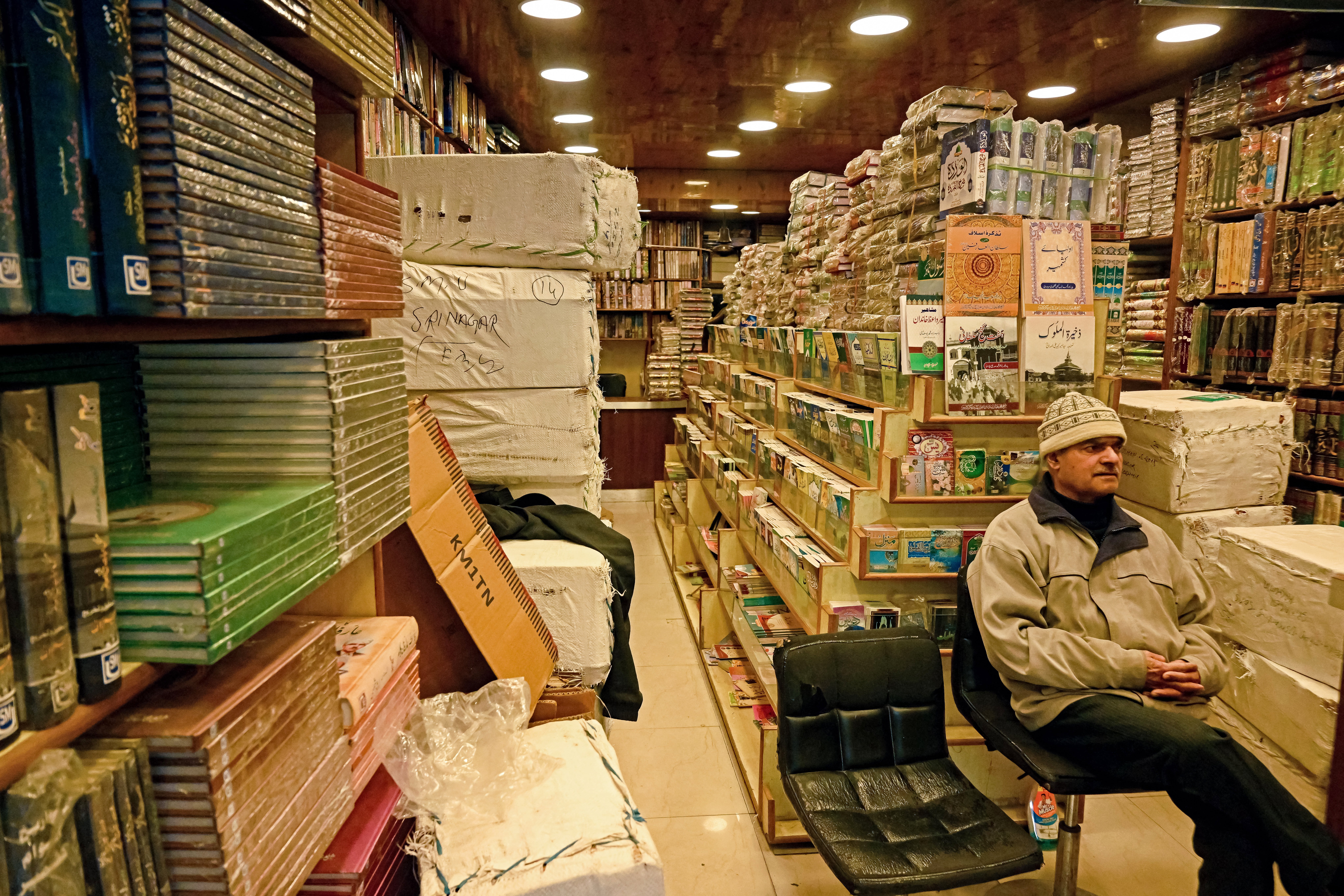Indian police raided bookstores in the restive Himalayan region of Kashmir after authorities banned 25 books for allegedly promoting “false narrative and secessionism”.
The books were banned earlier this week by the provincial administration of lieutenant governor Manoj Sinha, appointed by Narendra Modi’s Hindu nationalist government.
The order banning the books threatens people with jail time for selling or owning works by authors like Booker-winning novelist Arundhati Roy, constitutional scholar AG Noorani, and historians Christopher Snedden, Sumantra Bose and Victoria Schofield.
The “identified 25 books have been found to excite secessionism and endangering sovereignty and integrity of India [sic]”, the order, issued by Kashmir’s home department, said, adding that such works of scholarship played “a critical role in misguiding the youth, glorifying terrorism and inciting violence against [the] Indian state”.
The action was taken following “investigations and credible intelligence” about “systemic dissemination of false narratives and secessionist literature” that was “often disguised as historical or political commentary”, it said.
The order declared the 25 books “forfeit” under India’s criminal code, effectively banning them from circulation and possession in Kashmir.
The works include political commentaries, documentation of human rights violations and historic accounts of the disputed region.
Kashmir, one of the most militarised places on earth, is claimed in full but held only in part by both India and Pakistan. In the part administered by India, an armed struggle for independence has seen nearly 100,000 people killed and thousands subjected to what campaigners have described as “enforced disappearances”.
In August 2019, the Indian government did away with a constitutional guarantee of autonomy for Kashmir, putting it under direct rule by New Delhi. In the aftermath, it outlawed several political groups and threw thousands of political workers, activists, lawyers, and students in prison, where many of them remain.
The raids on Thursday did not spare even roadside book vendors of printed publications in the main city of Srinagar and outlying towns. By the end, local media reported, several volumes of the outlawed books had been seized.
The “authoritarian ban” triggered outrage.
Mehbooba Mufti, a former chief minister, said that banning books would not erase history but only “fuel division”.
“In Kashmir, suppressing democratic voices and fundamental freedoms deepens alienation and mistrust,” she said. “Censorship doesn’t silence ideas, it amplifies their resonance.”
Mirwaiz Umar Farooq, a top cleric and major figure in the political movement for independence, said the ban “only exposes the insecurities and limited understanding of those behind such authoritarian actions, and the contradiction in proudly hosting the ongoing Book Festival to showcase its literary commitment”.
Roy’s Azadi, a collection of essays referencing the thousands of people allegedly killed and disappeared in Kashmir by Indian forces, is also on the banned books list. Roy won the PEN Pinter Prize last year and was hailed as a “luminous voice of freedom and justice”.
The celebrated writer faces prosecution in Delhi over a 2010 speech disputing the notion of Kashmir being an “integral” part of India.

Mr Bose, the Indian historian whose Kashmir at Crossroads was among the banned books, rejected “any and all defamatory slurs” against his work.
“I have worked on Kashmir – among many other subjects – since 1993. Throughout my chief objective has been to identify pathways to peace so that all violence ends and a stable future free of fear and war can be enjoyed by the people of the conflict region, of India as a whole, and the subcontinent,” he told PTI.
“I’m a committed and principled advocate of peaceful approaches and resolutions to armed conflicts, be it in Kashmir or elsewhere in the world.”
Angana Chatterji, author of the newly banned Kashmir: The Case for Freedom, said authoritarian regimes banned books to assert and mobilise their power “as they govern through suppression, fear, and violence”.
David Devadas, author of In Search of a Future: The Story of Kashmir, argued that banning books was “against the grain of our democratic ideals, and our civilisational ethos”.
“My book strongly advocates peace, dialogue and democracy in the spirit of prime minister Vajpayee’s peace process which had reached fruition around the time my book was completed. I fully backed that peace process,” he said, referring to former Indian premier Atal Bihari Vajpayee.
Amnesty India said in a post on X (Twitter) that the crackdown on books was not “just about Kashmir”. “It’s about free expression,” the rights group said. “If books can be silenced without any due process, so can people.”
In February this year, police had similarly raided bookstores and seized hundreds of volumes linked to a major Islamic organisation in Kashmir.
In 2011, police filed charges against Kashmir’s education officials over a textbook for first graders that illustrated the word “tyrant” with a sketch resembling a policeman.
A year earlier, police had arrested a college lecturer alleging he had given his students an English exam filled with questions attacking a crackdown on demonstrations challenging Indian rule in the region.

